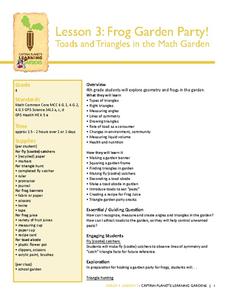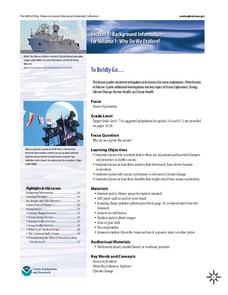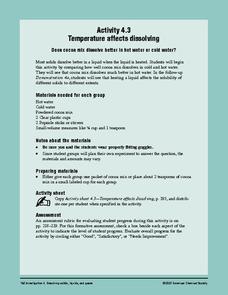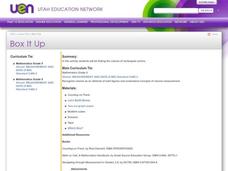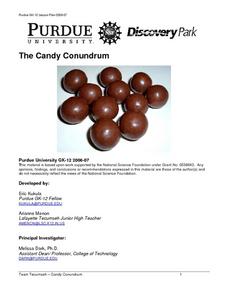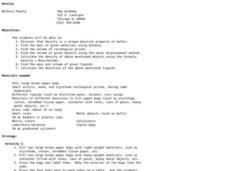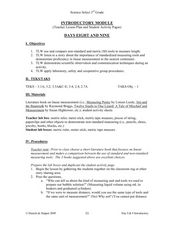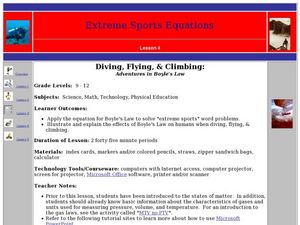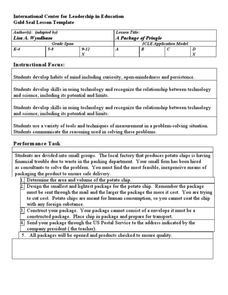Bowland
AstroZoo
Rescue animals in the zoo by applying math concepts. Groups of learners solve three missions involving oxygen, food, and climate control. Each group selects an animal from one of four bio-domes.
Captain Planet Foundation
Frog Garden Party! Toads and Triangles in the Math Garden
It's frog party time! With frog banners, frog juice, and a triangle hunt, your garden party is sure to be both entertaining and educational. The lesson connects geometry, earth science, and delicious snacks to teach kids about ecosystems...
Consortium for Ocean Science Exploration and Engagement (COSEE)
Ocean Acidification: Whats and Hows
Open this lesson by demonstrating the production of acidic carbon dioxide gas by activated yeast. Emerging ecologists then experiment with seashells to discover the effect of ocean acidification on shelled marine organisms. They measure...
American Chemical Society
Density: Sink and Float for Liquids
We don't think of liquids as floating typically, but a quick look at any oil spill tells a different story. Lesson explores various densities of liquids and why this fact is important. After observing the density variation, scholars...
NOAA
To Boldly Go...
When we think of ocean exploration, many of us have visions of sunken pirate ships full of treasure or mysterious creatures of the deep. What really motivates deep-sea investigation? The first in a series of diverse six-part lessons...
American Chemical Society
Temperature Affects Dissolving
Stir chocolate drink mix into hot and cold water to see if there is a difference in how quickly it dissolves. Number three in a six-lesson plan unit on dissolving, this installment investigates the effect of temperature. If you consult...
NOAA
Watch the Screen!
Can a sponge cure cancer? Life science pupils visit the drugstore under the sea in the fifth activity of six. Working groups research the topic then get hands-on experience by testing the inhibiting effects of several plant extracts...
Curated OER
Who Has the Biggest Mouth?
Pupils divide into groups of three or four, elect in their group who they think has the biggest mouth. This question will be followed by Mrs. Peters' joke about big mouths and frogs. Students then be asked how they could prove to the...
Pennsylvania Department of Education
Volume of Compound Figures
Fifth graders use patterns, models and relationships to solve equations. In this equations lesson plan, 5th graders define vocabulary for equations and complete worksheets explaining variables and solving problems.
Curated OER
Box It Up
Fifth graders make boxes. In this prisms lesson, 5th graders read the book Counting on Frank and discuss the different things that the boy measures. Students make boxes of various sizes using graph paper and find their volume.
Curated OER
Using Density to Identify Metals
Students learn how to measure the density of metals. In this density of metals lesson plan, students measure the density of various metals in order to determine what metals were substituted in a king's crown, scepter, breast plate and...
Curated OER
The Candy Conundrum
Students design a candy container that contains a specific amount of candy. They demonstrate how an engineering problem can be solved with math and that there are multiple answers to the problem. They compute volume of spheres.
Curated OER
To Float or Not to Float, That is the Question?
Ninth graders develop operational definition of density, do computations using density equation, categorize pieces of matter as being able to float on
water or not, based on density, explain why some objects sink or float based on...
Curated OER
Density
Young scholars find the mass, volume, and density of various objects. In this density measurement lesson, students observe how same-sized objects can have different masses, then use water displacement to find the density of each object...
Curated OER
Introductory Module
Third graders examine the non-standard method of measurement and compare it to the metric system of measurement. In this introductory module lesson, 3rd graders discover the scientific observation. Students also develop communication...
Curated OER
Diving, Flying, & Climbing
Learners explore Boyle's Law. In this Boyle's Law instructional activity, students complete problems involving Boyle's Law. They examine the effects of Boyle's Law upon the human body. Learners use the Internet to complete a lab...
Curated OER
Density Lab
High schoolers find the density of two substances. In this density lesson plan, students determine the density of water and ethyl alcohol and compare their densities. They enter their data into the computer to produce a class compiled...
Curated OER
Observing Sound
Second graders study the five senses and the link between pictures and sound. For this sound lesson students discover that sound is vibration, it is described by volume and pitch.
Curated OER
A Package of Pringle
Here is a problem-solving lesson that has learners take the role of a packaging expert to design an inexpensive means of packaging a potato chip. It could benefit from having more specific detail about the lesson itself, but it does make...
EduGAINs
Making Savvy Consumer Choices
It's never too early to learn about grocery budgeting. Middle schoolers delve into the world of consumer math with a lesson that focuses on both healthy choices and real-world math applications. Groups work together to form a grocery...
Kenan Fellows
Density
Most scholars associate density with floating, but how do scientists determine the exact density of an unknown liquid? The third lesson in a seven-part series challenges scholars to find the mass and volume of two unknown liquids. Each...
Nuffield Foundation
Effect of Size on Uptake by Diffusion
Cell size is limited by the surface area to volume ratio, but why is this true? Scholars measure the surface area and volume of cubes before placing them into liquid. After a set amount of time, they measure the uptake by diffusion for...
Alabama Learning Exchange
Float or Sink?
Experiment with mass and density as scholars figure out what makes things float or sink. First, they watch a podcast introducing these concepts. Be sure to use the comprehension question to test their understanding. Young scientists...
Virginia Department of Education
Moles Lab Activities
Want my name and number? It's 6.0221415 times 10 to the 23rd, and my name is Avogadro. Providing nine different activities, experiments, and labs, this activity keeps Avogadro relevant to your class all year long.

